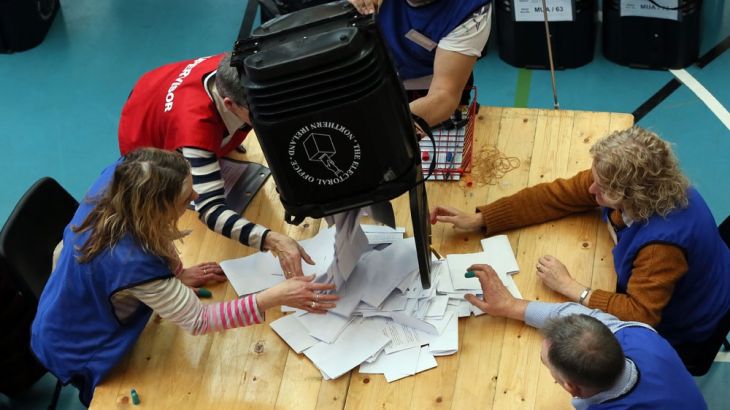Sinn Fein surges in tight Northern Ireland elections
Unionist DUP now has just a one-seat advantage as nationalist parties achieve best result in history of province.

The pro-British Democratic Unionist Party narrowly remained Northern Ireland’s largest party after edging nationalists Sinn Fein by a single seat in a snap election called after the government collapsed.
It was the closest nationalists, traditionally backed by Catholics, have ever come to becoming the biggest party in the Protestant-majority province. Unionist candidates, who tend to be favoured by Protestants, captured less than half of the seats for the first time.
Voters turned out in their highest numbers for two decades in the first regional election in the UK since its vote to leave the European Union as nationalists who favour a united Ireland and unionists who want the province to remain British jostled for influence.
READ MORE: Northern Ireland holds snap assembly election
Final results from Thursday’s assembly elections showed the DUP had won 28 seats and Sinn Fein 27 in the province’s semi-autonomous 90-seat parliament after all ballots were counted on Saturday.
“Let us now move forward with hope, hope that civility can return to our politics,” outgoing first minister Arlene Foster of the DUP told supporters after her re-election on Friday.
“There is work to be done to quickly mend the relationship which has been frayed by the discord of this election.”
Sinn Fein’s leader Michelle O’Neill told journalists it was an “amazing day” as her party benefited from a jump in turnout to 65 percent, the highest since the first elections held after the 1998 Good Friday peace agreement.
Al Jazeera’s Lawrance Lee, reporting from Belfast, said the nationalist party managed to recast itself successfully in the recent months.
“Michelle O’Neill has no direct link to the Irish Republican Army (IRA) and they have been campaigning as entirely non-sectarian, what they would call it as progressive issues like gay marriage and women’s rights,” he said.
“They have very successfully managed to portray the DUP as a dinasaur party stuck in a sectarian past which no longer exists.”
The DUP’s failure to win at least 30 seats also means it no longer has the power to veto legislation on its own, something the conservative party had used to block extending gay marriage to the province.
Power-sharing
The two largest parties now have three weeks to form a new power-sharing government to avoid devolved power returning to the British parliament at Westminster for the first time in a decade.
But with relations at their lowest point in a decade, Sinn Fein insists among its demands for re-entering government that Foster must step aside while months of investigations begin into a botched green energy scheme that she established.
READ MORE: May – Northern Ireland crisis mustn’t jeopardise peace
The former political wing of the Irish Republican Army, who accused the DUP of not treating it as equals before collapsing the previous administration in January, will be further buoyed by their strong showing.
Brexit factor
No one predicts the impasse will bring a return to the violence that killed 3,600 people in the three decades before the peace agreement. But some are warning there could be a deterioration in community relations, coupled with government paralysis as Brexit talks determine the province’s political and economic future.
Northern Ireland voted to stay in the EU, but was overruled by a majority vote to leave in Britain as a whole.
Britain has signalled its intention to leave the EU’s customs union after Brexit, raising fears of a new hard border between Northern Ireland and the Republic of Ireland, which is an EU member state.
READ MORE: Why a hard Brexit will cost the UK more than Europe
“Negotiation are due to begin Monday and they have three weeks to try to work out what they are going to do to keep the executive going, if they can’t do that then power returns to London and it will be disaster in the northern Irish politics, given that majority of politicans are against brexit,” Al Jazeera’s Lawrance Lee said.
London, Dublin and Brussels have all insisted they want to keep free movement across the Irish border – a key component of the Good Friday agreement.
But the possibility of a return to checkpoints has stirred memories of The Troubles when cross-border smuggling was rife and British outposts along the frontier became targets for IRA fighters.
|
|